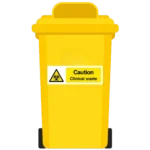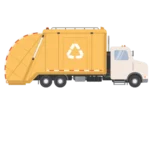Clinical waste collection
Save money on your clinical waste collections today
Just enter your business postcode…
Save money on your clinical waste collections today
Just enter your business postcode…
Start saving now
UK hospitals and clinics have a legal duty of care to safely manage and dispose of hazardous medical waste. It is crucial to have the right waste partner to help you navigate the risks associated with generating and storing clinical waste.
Our waste experts have assisted thousands of healthcare institutions in finding the best clinical waste services in their area.
This guide provides an overview of clinical waste collection and disposal services. We cover:
Clinical waste collection providers are medical waste experts who can assist healthcare institutions in safely and effectively disposing of their clinical waste.
We’ve summarised the services offered by our clinical waste collection providers:

Before accepting clinical waste from a hospital or clinic, waste providers typically require a clinical waste audit to assess the nature of your waste. See more information on clinical waste audits below.

Based on the pre-acceptance waste audit, a clinical waste collection firm will provide suitable storage bags, containers, and labels to help your business safely segregate and store clinical waste.

Clinical waste collection firms operate fleets of waste vehicles with regular routes, collecting clinical waste and delivering it to dedicated clinical waste Energy Recovery Facilities for disposal.

Most types of clinical waste are safely disposed of at a clinical waste incinerator facility, which recovers renewable energy from medical waste. See more on clinical waste disposal methods below.

The clinical waste collection experts will be able to offer expert advice on procedures and the waste transfer notes required to comply with the NHS’s Health Technical Memorandum – 07-05 on healthcare waste.

Expert clinical waste firms are available to provide guidance on clinical waste minimisation in line with the waste hierarchy. The best firms offer on-site training for your staff members.
Clinical waste is legally defined by the Controlled Waste Regulations 2012 as waste produced from healthcare activities that are contaminated with or contains:
Most clinical waste produced by healthcare institutions is classified as hazardous waste.
Here is a summary of the waste classification codes associated with the UK healthcare sector.
| Waste Code | Description |
|---|---|
| 18 01 01 | Sharps (except 18 01 03) |
| 18 01 02 | Body parts and organs including blood bags and blood preserves (except 18 01 03) |
| 18 01 03 | Wastes whose collection and disposal is subject to special requirements in order to prevent infection |
| 18 01 04 | Wastes whose collection and disposal is not subject to special requirements in order to prevent infection (for example dressings, plaster casts, linen, disposable clothing, diapers) |
| 18 01 06 | Chemicals consisting of or containing hazardous substances |
| 18 01 07 | Chemicals other than those mentioned in 18 01 06 |
| 18 01 08 | Cytotoxic and cytostatic medicines |
| 18 01 09 | Medicines other than those mentioned in 18 01 08 |
| 18 01 10 | Amalgam waste from dental care |
Source: Gov.uk Waste Classification Technical Guidance
The Environment Agency requires all clinical waste-producing organisations to periodically conduct a clinical waste audit. Clinical waste firms can only collect waste from a clinic that holds a valid clinical waste audit report.
A clinical waste audit informs your waste provider of the types of waste they must collect, allowing them to arrange appropriate disposal methods.
Our trusted clinical waste firms require a pre-acceptance clinical waste audit as part of their onboarding process.
There are three different acceptable types of clinical waste audits.
The clinical waste audit evaluates the following aspects for each type of generated clinical waste.
Clinical waste audits must be conducted at least as frequently as:
Source: Gov.uk – Healthcare waste page.
In this section, we’ll summarise NHS guidelines and best practices for managing and storing clinical waste prior to collection.
Smaller clinical waste bins are used to segregate clinical waste at the location where it is generated.
It is recommended that smaller clinical waste bins are:
Clinical waste should be stored in a secure, designated area away from public access.
Hospitals and clinics are legally responsible for ensuring that clinical waste is properly packaged and labelled before collection by a licensed commercial waste provider.
Commercial waste collection providers are legally obligated to refuse the collection of any clinical waste that has not been adequately labelled.
A clinical waste collection provider will supply a large commercial waste bin for each category of clinical waste produced by a healthcare facility. These bins must be stored in a secure location accessible to your provider’s waste vehicles.
A commercial waste disposal firm will issue a waste transfer note when collecting clinical waste from UK businesses. These specialist waste collection firms dispose of clinical waste in compliance with UK regulations, typically through one of the following methods:

Energy can be recovered from certain classes of clinical waste at an Energy Recovery Facility, in line with the Environmental Agency’s guidance.

Disposal to a sewage treatment plant is permissible with trade effluent permission from the local wastewater company.

Where energy recovery is not feasible, landfill serves as the final option for the long-term disposal of clinical waste.
Our commercial waste experts answer those commonly asked questions regarding clinical waste collection.
The proper disposal of clinical waste is crucial for several reasons, but primarily, it safeguards healthcare workers, patients, and the wider community from infections, injuries, and diseases. Clinical waste frequently contains potentially harmful microorganisms that can propagate disease if not managed correctly.
The comprehensive laws and regulations governing the management of clinical waste are designed to protect healthcare workers, the community, and the environment from the risks associated with poorly managed clinical waste disposal.
The clinical waste collection providers we collaborate with are all obligated to comply with the waste hierarchy, which aims to minimise the use of landfills in clinical waste disposal.
Recently, waste disposal providers have made significant efforts to reduce carbon emissions associated with clinical waste by utilising energy recovery facilities more extensively.
Clinical waste collections are provided by regional specialist waste firms and some local councils.
To explore the clinical waste services in your area, visit our dedicated local waste pages. Although we work across the UK, here are our top locations for clinical waste: